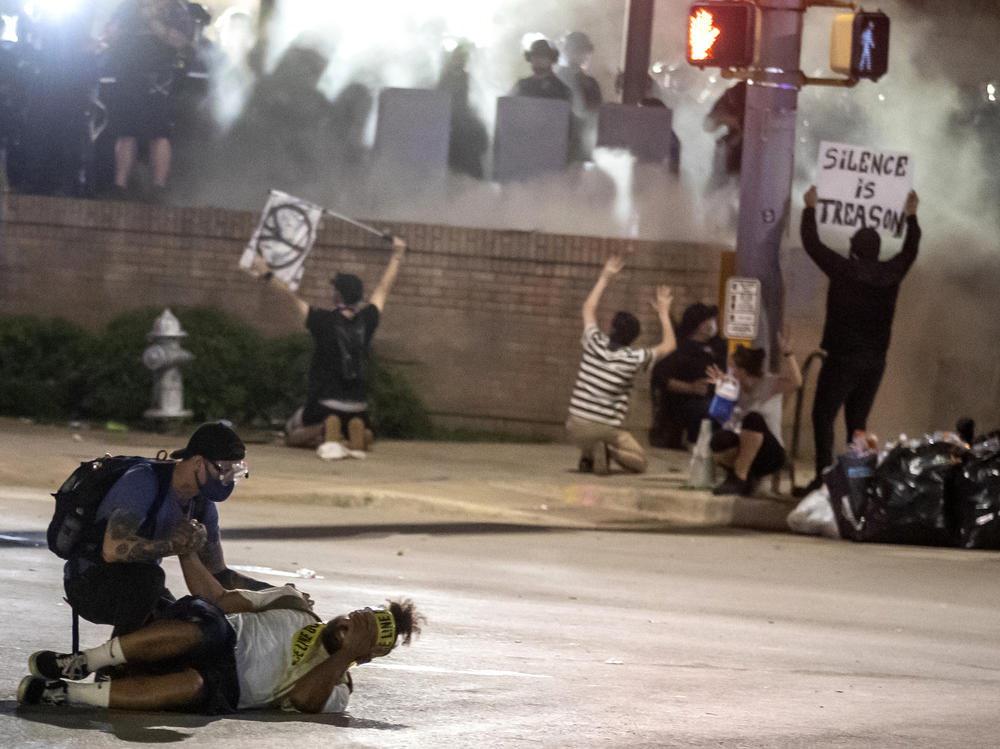Section Branding
Header Content
19 Austin police officers indicted from investigation into 2020 protests, sources say
Primary Content
AUSTIN, Texas — A Texas grand jury indicted 19 Austin police officers on charges of aggravated assault with a deadly weapon for their actions during 2020 protests over racial injustice that spread nationwide following the killing of George Floyd, according to people familiar with the matter.
Multiple people spoke to The Associated Press Thursday on condition of anonymity because they were not authorized to discuss the case publicly.
It ranks among the most indictments on a single police department in the U.S. over tactics used by officers during the widespread protests — methods that led to the resignation or ouster of several police chiefs across the country.
Word of the indictments came hours after Austin city leaders approved paying $10 million to two people injured by police in the protests, including a college student who suffered brain damage after an officer shot him with a beanbag round.
Combined, the announcements amounted to Texas' liberal capital taking some of its biggest actions as criticism still simmers over its handling of the protests, which intensified pressure on then-Police Chief Brian Manley to eventually step down.
Jose Garza, the district attorney for Travis County, which includes Austin, spoke to journalists Thursday afternoon about the grand jury investigation but gave no specifics about it, including how many officers are facing charges, and for what crimes.
"Our community is safer when our community trusts enforcement. When it believes law enforcement follows that law and protects the people who live here," Garza said. "There cannot be trust if there is no accountability when law enforcement breaks the law."
Police union president calls charges politically motivated
Ken Cassidy, the president of the Austin Police Association, said that "numerous officers" have been indicted but that he was not sure of the total number facing charges.
Cassidy called the move "devastating" for city law enforcement but also said he's confident that no officer will be convicted. He criticized Garza, calling the investigation politically motivated.
"DA Garza ran on a platform to indict police officers and has not missed the opportunity to ruin lives and careers simply to fulfill a campaign promise," Cassidy said.
Garza said his office prosecutes anybody who causes harm "regardless of who causes it."
The settlements approved Thursday are among the largest paid to people who were injured by police across the U.S. during massive protests that followed Floyd's death.
The largest of the Austin settlements gives $8 million to Justin Howell, who was 20 years old when police shot him with a beanbag round. Family members told the AP following the incident that Howell suffered a cracked skull and brain damage, leaving him in critical condition for multiple days.
The city will also pay $2 million to Anthony Evans, who was 26 when an Austin police officer shot him with a beanbag round in a separate incident, which resulted in extensive medical treatment in his jaw.
Austin Mayor Steve Adler said the settlements "remind us of a real difficult and painful moment in our city." A representative for the Howell family did not immediately respond to a request for comment.
Cities still addressing fallout from 2020 protests
It is the latest reflection of how, two years after the protests that swept across the country, cities are still addressing the injuries and tactics used by police. Earlier this month, prosecutors announced charges against two Dallas police officers accused of injuring demonstrators after firing less lethal munitions.
After the protests in Austin, Manley later said Howell was not the intended target after an altercation in a crowd, which he said involved people who threw objects at a line of officers. Authorities have said that led to the officers firing at the mass of protestors from above.
David Frost, who captured on video the moments after Howell was shot, told the AP that he saw protesters throwing fist-sized rocks and water bottles at the line of police on an overpass. Then he saw Howell fall. He was bleeding heavily and went into a seizure, Frost said at the time.
Frost's video shows that as medical volunteers moved Howell to a safe place, officers again opened fire towards them.
The settlements are the second and third payments awarded among a dozen lawsuits filed in Austin that have claimed injuries from the protests. Earlier this month, The Austin American-Statesman reported that a $150,000 settlement was approved for a woman named Ariana Chavez, who was shot in the head with less lethal munition resulting in a concussion.
At least 19 people were hospitalized in Austin following the protests. Dr. Kristofor Olson told the AP he was on duty at the Dell Seton Medical Center emergency room in Austin when the patients — ranging in age from 16 to 54 — came in. He said he was shocked at the volume of people coming in with beanbag injuries both nights in late May.
Eleven officers were disciplined for their actions in the early summer protests, with seven additional officers placed on administrative duty.
Copyright 2022 NPR. To see more, visit https://www.npr.org.

